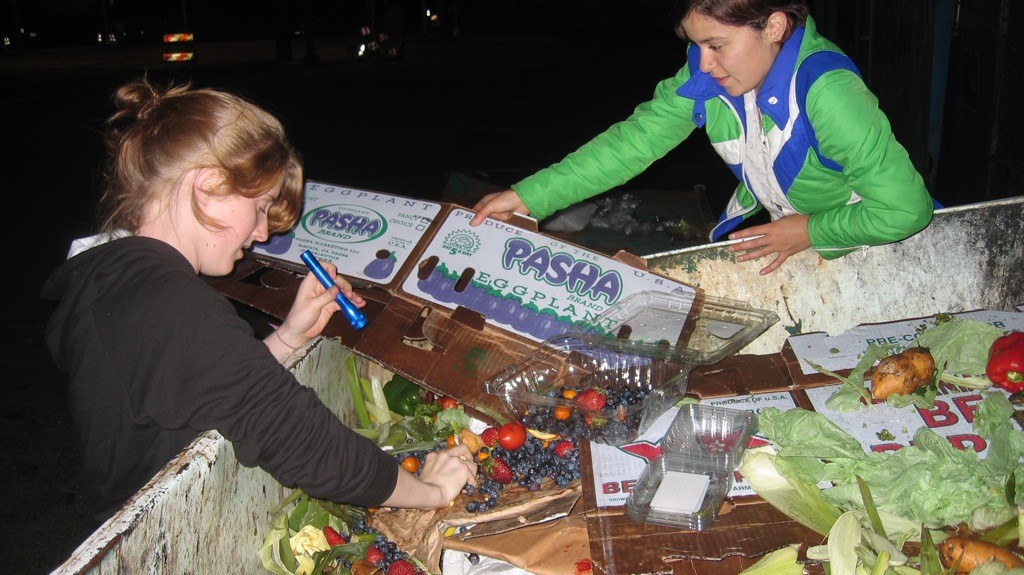Lifestyle & Culture
Despite Barriers, “Dumpster Diving” for Eats Goes On
Although it’s less possible than it used to be to “dumpster dive” for food that grocery stores throw in the trash, some diehard divers say they’re determined to keep scavenging.
They do face some obstacles.
For example, the Trader Joe’s supermarket on Sixth Avenue, near 23rd Street, has been increasing its donations to food pantries, soup kitchens and other programs that feed people who struggle to get their own food, leaving less food for divers.
“There will always be problems with people picking through garbage. But we have a donations program that does good for the community,” said Mike Tipp, that store’s manager. “Any food in packaging that can’t be sold will be donated. We donate to the homeless, and people will pick it up several times a day.”
At Whole Foods in Union Square, all food is destroyed in a trash compactor that is behind a locked door inside the facility. A man who identified himself as a supervisor, but declined to give his name, said his supermarket donates leftover food no longer considered suited for sale to City Harvest, a charity serving people without enough food.
Dumpster divers Janet Kalish, 51, and Gio Andollo, 29, are concerned about changes like those. They have their own ideas about what is driving the change.
For one, the New York City Department of Sanitation fines businesses and others who violate rules on littering $50 to $250 per violation.
“Stores don’t like it when they get tickets for messes and … making messes will cause stores to discourage dumpster diving,” said Kalish, a high school Spanish teacher and organizer of freegan.info, a website for those who’ve organized to opposed very aspects of what they consider the corruptions of capitalism.
In the opinion of Andollo, organizer of Uptown Freegans, grocery stores also are concerned about the bad publicity that sometimes get linked with food going to waste. “It makes them look bad,” Andollo said. “When I go out, a lot of times I go out with journalists or student journalists, people with cameras. So, grocery store owners get wary of that. They don’t want that publicity.”
According to a 2014 report from the U.S. Department of Agriculture Economic Research Service, “133 billion pounds … of the available food supply at the retail and consumer levels in 2010 went uneaten.”
Dumpster diving is one way that freegans and others—not every diver is freegan—try to cut that statistic on food waste.
“We’re rescuing foods and edible items because it isn’t garbage,” said Kalish, explaining that freegans are activists who oppose waste in many areas of U.S. society. Her network has roughly 1,000 members in New York City, she said.
She continued: Food gets trashed because “sometimes it’s the sell-by date that’s passed, or the item is sticky. Sometimes an item is bought in mass quantity and it’s not moving. At other times, the season is over and seasonal items are thrown out.”
Food expiration dates mainly indicate when food has lost its optimal quality, according to the FDA. Food may be safe to eat even beyond sell-by and use-by dates, depending upon how they’re stored.
What gives divers the right to collect food whose freshness date has expired and other trash is a 1988 U.S. Supreme Court ruling. That ruling, California vs. Greenwood, gave people the right to dig through trash and other items left in alleys, on sidewalks or other public property.
Partly to combat dumpster divers who make a mess, Kalish said, some grocers “take bags of flour or bags of salads and will slash them up. They’ll also take boxes of cereal and cookies and spill them in the dumpster to discourage people.”
Andollo views those actions in the same light as he views his own experiences of being harassed by grocery store security guards or having the police called to keep him from dumpster diving.
He also said this is a complex issue: “People that manage or work for grocery stores, pharmacies, bakeries, they’re also working class people who are also making sense of this world and this economy.
“Our objective is not to demonize them, or make life more difficult for them. We just want to rescue the food and help them to see how the waste hurts everyone, including them.”


